

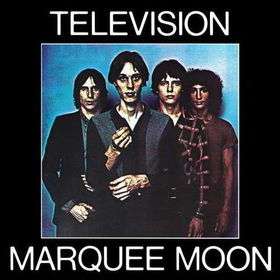 Television
Television
| Release date | Label | Producer | Genre | Length | More info |
| 1977.02.08 | Elektra | Andy Johns / Tom Verlaine | Post-Punk | 46:26 |  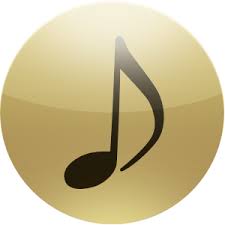
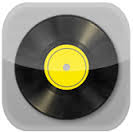 |
Punk for art's sake, or "The Day French Primordial Ideals Finally Came To CBGB" .
Background
It is a bit funny that the quintessential "post-punk" album, released in early 1977 (and recorded as early as the fall of 1976), had to see the light of day even before the punk aesthetics as such had a chance to crawl out of the underground. But as vague as the term "post-punk" is, it at least applies nicely to Marquee Moon - an album made after the first, truly "punkish", stage of Television, was already over. In the earliest days (1973-75), the band was indeed dominated by the conflicting forces of Tom Verlaine and Richard Hell, and the music they made together was messy, angry, defiantly unprofessional, and proud of it, quite satisfying the "punk" requirements of the day even without the chainsaw buzz component. But as Hell eventually quit to pursue his personal destiny and the role of the second most important member in the band fell to second guitarist Richard Lloyd, Television quickly began to "mature", leaving behind the barely controlled fury of its early days and disciplining themselves into one of the tightest and most perfectly calculated musical units of the day - probably the tightest, period, among Spartan rock bands that never got around to hiring a separate member to play the keyboards, or a separate frontman to handle all the vocals.
It is worth remembering that most of the early 1970s bands that came, in retrospect, to be labeled as "proto-punkers", were in fact tremendously influenced by the glam vibes of the day - the MC5, the New York Dolls, the Stooges, even Lou Reed cared quite a bit about putting on a big theatrical show, and since big shows needed big sound, most of them weren't averse to "thick" guitar tones and extra instrumentation (keyboards, brass, etc.). Confusing as it is, it actually brought the artistry closer to the art-/prog-rock standards of the day, with the animal viciousness of the proto-punkers replacing the intellectual fantasies of the proggers. Television were among the first bands to root out and discard most of those "showy" elements - yet their goal, too, was to somehow bridge the gap between the intellectual complexities of art-rock and the straightforward entertainment of the glam-rockers and proto-punkers, by making music that would, on one hand, definitely be "rock" (none of that pretentious symphonic overlay), but, on the other hand, would be always breaking out of "rock"'s cliched embrace, showing the world that guitar-based music could not and should not be reduced to a bunch of blues figures and Chuck Berry-isms. In doing that, they would be advancing the spirit of the Velvet Underground - but avoiding the latter's avantgardist excesses, although, like the Velvets, Television would always place their artistic integrity and independence before any commercial considerations. But most importantly, they were just a batch of young, fresh, idealistic players on the mid-1970s scene who wanted to make a difference, and so they did.
Some basic factsJust like The Velvet Underground a decade before them, the band failed to achieve popular recognition and financial success in their homeland (so much for New York as an actual part of America), but fared seriously better in the UK, where Marquee Moon rose all the way to #28 on the charts (and its less exciting follow-up, Adventure, would climb even higher than that by inertia). However, serious critical press took to them almost immediately: the album was hailed as a modern masterpiece even by the usually hard-to-please Robert Christgau, and then went on to influence... well, just about anybody who's anything in the indie-rock / college-rock / alt-rock etc. community, at least, if their own words are to be believed. The band never lived up to the promise of the debut: Adventure was received with relative cold reservation in comparison, and the band fizzled out soon after that, occasionally getting back together for touring and stuff (they even had a self-titled comeback album in 1992) - but approximately 99% of Television's posthumous reputation remains grounded in Marquee Moon, and for a good reason.
For the
defense
To put it simply (without saying anything particularly new, I'm afraid), Marquee Moon is one of the greatest guitar rock albums of all time, period. But what makes this less than simple is that the album came out in a post-Hendrix world in which "guitar virtuosity" was most commonly associated with speedy-fingered progressive rock players or heavy metal monsters (Van Halen was already on the horizon), and certainly not with the amateur young bands selling themselves for the curious CBGB-going public. Much has been said about the "weaving" style of Verlaine and Lloyd, where the lines between rhythm and lead guitar were always blurred, but it is not so much the "weaving" itself that matters (Keith Richards and Ronnie Wood were already doing that before they'd even heard of the band, and in their own style) as the individual technique of the two players. Most of the music on Marquee Moon is jagged, angular, rehearsed (in a direct violation of the textbook "punk aesthetics") to the point of suffocation, and sounding unlike anything that came before - an odd synthesis of a little pop, a little blues-rock, a little funk, a little drone, and, actually, a bit more prog-rock than certain pundits would have you believe (ʻTorn Curtainʼ). If anything, the guitar playing on Marquee Moon could be counted as an original precursor to "math-rock" - the various geometrical configurations generated and tightly locked by Verlaine's and Lloyd's respective parts are often twisted, bizarre, and inscrutable, although both guitarists understand very well the emotional potential of a single sustained note, and ultimately the music never really feels complex just for the sake of complexity.
The two sides of the album also have a geometry of their own - three shorter songs (slightly more aggressive and punkish on Side A, slightly more elegiac and lyrical on side B) followed by one longer epic - and, to some extent, it agrees with the geometry of the Stooges, whose Fun House also alternated short, speedy, maniacal blasts with longer, more atmospheric and "artsy" grooves. However, with the Stooges, these two sides of the band's personality contrasted with each other; on Marquee Moon, the short tracks have no principal differences from the long ones; the extended guitar solo on the title track really ends up being there just because it'd been working out so well in context, and because the sonic build-up needed to be taken to its emotional climax in due time, rather like the long organ/guitar solo on the Doors' ʻLight My Fireʼ. If you get properly caught up in the vibe, you won't even notice that ʻMarquee Moonʼ actually crosses the ten minute mark - it's just like, you know, verse 1, chorus, verse 2, chorus, solo, verse 3, chorus, second solo, coda, nothing else.
But oh boy, what a song. Classic introductory build-up - first guitar comes in with a two-chord syncopated rag-a-riff, second guitar comes in with a "babbling" counterpoint, bass, drums, vocals, a feel of something distantly alarming, but not necessarily dangerous: "I was listening, listening to the rain / I was hearing, hearing something else". Actually, the lyrics don't matter much here - only the way they are delivered by Tom, who seems to be wishing to share some life-changing, mind-shattering event with us on a level of symbolist abstraction that maybe even his namesake Paul would not have approved of - but never mind the words, just mind the voice. The voice might be the most punkish thing about the whole album, in fact: so young, so tense, so full of angst, pain, bitterness, and even, perhaps, of some implicit accusations hurled at the listener: I have no idea what it is I have done wrong, but I kind of end up feeling guilty all the same. Later on, the voice takes a break and is replaced by the guitar, a slightly dissonant jazzy solo that steadily climbs up, up, up, until the gods can't take it no more and, around 8:12, send a few thunderbolts to Earth to stop it. (Still they retain enough stamina to pull themselves together and replay the build-up once more for a coda section). There's nothing particularly cathartic or spine-chilling about ʻMarquee Moonʼ - it's all about tension, like a ten-minute trip on a highwire with your life and everything else hanging in the balance; and the relatively minimalistic, dry arrangement makes it a pretty intimate kind of a trip.
Next to this guitar masterpiece, the first three songs seem a little bit pale, but they are every bit as memorable. ʻSee No Evilʼ begins with a madly looped riff that bears a passing resemblance to the Doors' ʻYou Make Me Realʼ and lyrical lines that seem to be among the most accessible (and the most contemporarily relevant) on the album: "What I want, I want now, and it's a whole lot more than 'anyhow'". However, the band's sound is a bit too thin, and Tom's voice is a bit too high and whiny and romantic to make ʻSee No Evilʼ fit in perfectly with the epoch's major punk anthems - it remains in a category of its own, more of a personal declaration of rights against some unseen opponent than a strong public statement. As far as the old snap-and-bark is concerned, the record's angriest and "sexiest" song is undeniably ʻFrictionʼ (if you disagree with "sexiest" and insist on interpreting the word "friction" in a purely physical perspective, just listen to the way Tom sings the line "you complain of my dic... tion", with one of the most meaningful half-second pauses in the history of rock music), with a bunch of perfect lead guitar phrasing - without relying on too much distortion, echo, phasing or other effects, the lead guitar goes from wounded bluesy howl to noise-rock and back as if it all were the same thing. Not that Television could ever be salacious or anything: ʻFrictionʼ may have sexual connotations, but, like most of the songs here, it's mainly about a confused reaction to things, and all that guitar noise, being every bit as symbolist as the lyrics, suggests, at best, a mixed reaction to female presence in the protagonist's life.
Honestly, though, I believe that with the obvious exception of the title track, it is Side B that is the most fully realised and effective part of the album - Verlaine's artistry just sounds more natural when he brings on the plaintive mood, beginning with the quietly desperate ʻElevationʼ (which seems to be a song about self-imposed loneliness, as the protagonist tries to resist temptation), continuing with the half-anthem, half-prayer of ʻGuiding Lightʼ, and ultimately exploding in the record's second epic, ʻTorn Curtainʼ, a piano-embellished tragic finale where they completely empty their bag of guitar tricks to drive the listener to tears (even making the guitar sound like a miserable kitty-cat on the edge of starvation at one point). All these songs are just as good guitar-wise, and Verlaine's vocal tone seems more perfect for the "angry whine" approach than it is for the "angry-angry" one. There may not be any theatricality to the band's musicianship, but there is an operatic ring to Tom as a vocal performer (if anything, he reminds me more of Van Der Graaf's Peter Hammill than any single US or UK glam-rocker), and while the songs of Television do not generally place much emphasis on vocal hooks, lyrical lines like "I sleep light on these shores tonight" (ʻElevationʼ) and "Tears, tears, rolling back the years" (ʻTorn Curtainʼ) are sung with such tremendous emotional drive that they imprint themselves in memory very easily. And that vocal build-up on each verse of ʻGuiding Lightʼ? That's Van Morrison quality, easily.
Basically, Marquee Moon is one of those albums where you can never be sure that you properly "get" its message, or that there even is one - but it still gets by largely through the sheer power of its musical motor, an insanely overheated beast in full flight. Whatever colors those demons have that Verlaine is struggling to exorcise, they must be real, a truly nasty pack of demons if there ever was one. If you find yourself confused, like so many potential record buyers back in early 1977, just try to get in the groove - it ain't hard. The jagged shards of guitar chords spit out at mercilessly regular intervals, the howling and wailing bits, the ability to build a solo up to frenetic ecstasy, these things are much more telling about the true mission of Marquee Moon than any of the words.
For the prosecution
Like all experimental musical outfits, Television were not immune to occasional failures, and it is not likely that you will find all the songs here equally impressive. As I already said, Verlaine is not too hot on vocal hooks - even ʻSee No Evilʼ, despite each of its verses culminating in an ecstatic battle-cry, does not have a perfectly logical and catchy vocal resolution; and although I like ʻVenusʼ while it is playing, I can never ever remember how it went, because it values its lyrical paradox - "I fell right into the arms of Venus de Milo... I stood up, walked out of the arms of Venus de Milo" - more than it does a nice symmetrical / harmonic structure for its chorus. Fortunately, in most cases guitar hooks and grooves make up for the lack of polish in the vocal department.
A more serious problem could be had with the general inscrutability of the album. Its emotionality is very specific and unconventional: Marquee Moon can hardly be described in terms of "happy" or "sad", and even words like "angry" or "depressed" often seem misplaced in the context of these songs. And I do not even mean the words: the music itself, with all its dues to jazz and avantgarde, too often comes across as emotionally puzzling and in need of some intellectual decoding - which, of course, explains why the record could no more strike a chord with the general public than anything by, say, Frank Zappa. (At least Zappa always had a sense of humor - Television, at best, have a brief dark strand of it, which they use sneeringly and somewhat reluctantly). Of course, this is not a serious accusation as long as you believe that there is some substance to the album, in which case all you have to do is listen to it once a month or so; and there will always be "guiding lights" anyway, such as the dark aggression of ʻFrictionʼ or the personal tragedy of ʻTorn Curtainʼ.
Conclusion
| Melody | Voice | Mood | Production | Innovation/Influence | Where it belongs | RYM preference | |
 |
 |
 |
 |
 |
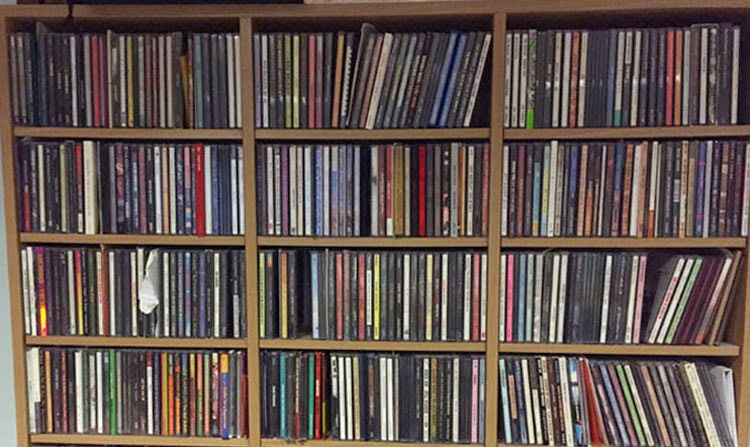 |
#25 (Jul 03, 2016) |
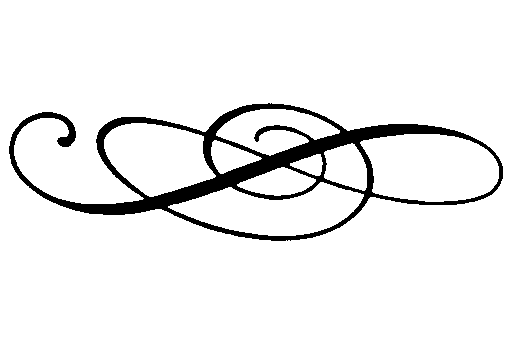
| Previous entry | Main page | Next entry |